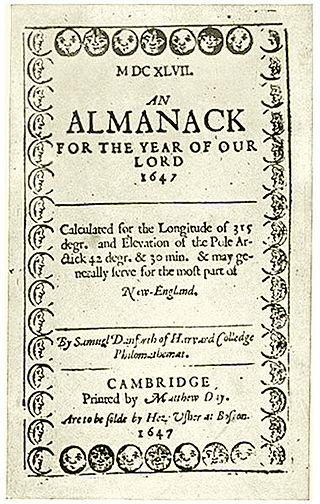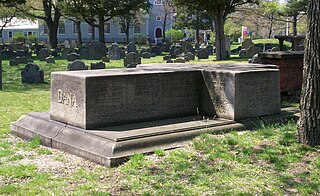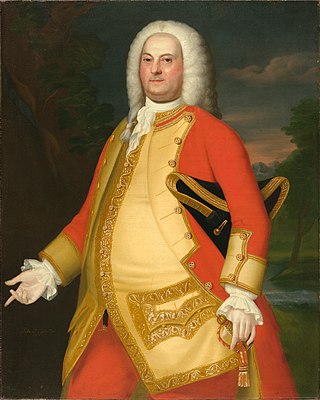Related Research Articles
Samuel Penhallow was a Cornish colonist and historian and militia leader in present-day Maine during Queen Anne's War and Father Rale's War. He was the commander at Fort Menaskoux and was attacked during the Northeast Coast Campaign (1724).

Paul Dudley FRS, Attorney-General of the Province of Massachusetts Bay, was the son of colonial governor Joseph Dudley and grandson of one of the colony's founders, Thomas Dudley.

William Stoughton was a New England Puritan magistrate and administrator in the Province of Massachusetts Bay. He was in charge of what have come to be known as the Salem Witch Trials, first as the Chief Justice of the Special Court of Oyer and Terminer in 1692, and then as the Chief Justice of the Superior Court of Judicature in 1693. In these trials he controversially accepted spectral evidence. Unlike some of the other magistrates, he never admitted to the possibility that his acceptance of such evidence was in error.

Lewis Morris, chief justice of New York and British governor of New Jersey, was the first lord of the manor of Morrisania in New York City.

Samuel Danforth (1626–1674) was a Puritan minister, preacher, poet, and astronomer, the second pastor of The First Church in Roxbury and an associate of the Rev. John Eliot of Roxbury, Massachusetts, known as the “Apostle to the Indians.”

Isaac Parker was a Massachusetts Congressman and jurist, including Chief Justice of the Massachusetts Supreme Judicial Court from 1814 to his death.

Jonathan Corwin was a New England merchant, politician, and magistrate. He is best known as one of the judges involved in the Salem witch trials of 1692, although his later work also included service as an associate justice of the Massachusetts Superior Court of Judicature, the highest court of the Province of Massachusetts Bay.
Stephen Sewall was a judge in colonial Massachusetts. Born in Salem, Massachusetts, he was the son of Stephen Sewall, the clerk of court at the Salem witchcraft trials, and a nephew of Chief Justice Samuel Sewall, who presided at the witchcraft trials. He was the uncle of lawyer Jonathan Sewall and of the poet, lawyer and patriot, Jonathan Mitchell Sewall of Portsmouth, NH.

Jeremiah Smith was a United States representative for New Hampshire, United States Attorney for New Hampshire, a United States circuit judge of the United States Circuit Court for the First Circuit, the sixth governor of New Hampshire and chief justice of the New Hampshire Superior Court of Judicature and the New Hampshire Supreme Judicial Court. He was a member of the Federalist Party.
Richard Waldron was a military officer, politician, and business figure of the Province of New Hampshire. He maintained the position of the Waldron family in Dover and colonial New Hampshire through intermarriage with other leading families and inheritance or purchase of many of the positions once held by his father. He was the first of his line to adopt "Waldron" as opposed to "Walderne", the spelling that his father and previous generations had used.

Richard Dana was a prominent lawyer and politician in colonial Massachusetts, and member of the Dana family.
Isaac Addington was an American lawyer who served as the Chief Justice of the Superior Court of Judicature, the highest court in the Province of Massachusetts Bay.
Isaac Winslow was an American politician and military officer who lived in Marshfield, Massachusetts. A member of the prominent Winslow family of the Plymouth Colony, he served as a civil and military official in a period marked by political transition.

Edmund Trowbridge was an American judge and lawyer. He is best known for being an associate justice for the Massachusetts Superior Court of Judicature, the highest court in the Province of Massachusetts Bay, during the Boston Massacre.
Jonathan Remington (1677–1745), was an Associate Justice of Massachusetts Superior Court of Judicature appointed by Gov. Jonathan Belcher. Judge Remington married Lucy Remington Bradstreet (1680–1743), a granddaughter of Gov. Simon Bradstreet. Their daughter Ann Remington was the first wife of William Ellery, a signer of the United States Declaration of Independence.
Benjamin Lynde Jr. was a justice of the Massachusetts Superior Court of Judicature from 1745 to 1771, serving as chief justice from 1769 to 1771. He was appointed by Governor William Shirley.

Nathaniel Hubbard was a justice of the Massachusetts Superior Court of Judicature from 1745 to 1746. He was appointed by Governor William Shirley. Hubbard was the grandson of early Massachusetts historian and clergyman William Hubbard, and was for many years resident in Bristol, then part of Bristol County, Massachusetts and now in Rhode Island.

Major-General William Brattle was an American politician, lawyer, cleric, physician and military officer who served as the Attorney General of Massachusetts from 1736 to 1738. Brattle is best known for his actions during the American Revolution, in which he initially aligned himself with the Patriot cause before transferring his allegiances towards the Loyalist camp, which led to the eventual downfall of his fortunes.

Samuel Phillips was an American Congregational minister and the first pastor of the South Church in Andover, Massachusetts. His son, John Phillips, was the founder of Phillips Exeter Academy, and his grandson, Samuel Phillips Jr., was the founder of Phillips Academy Andover and briefly the lieutenant governor of Massachusetts.

Captain Thomas Yale was a British American magistrate, politician and military officer. He was one of the founders of the town of Wallingford, Connecticut. He became Justice of the Peace, surveyor and moderator for Wallingford, and helped establish its first Congregational church in 1675. He was also elected, for numbers of years, as deputy to the Connecticut General Assembly.